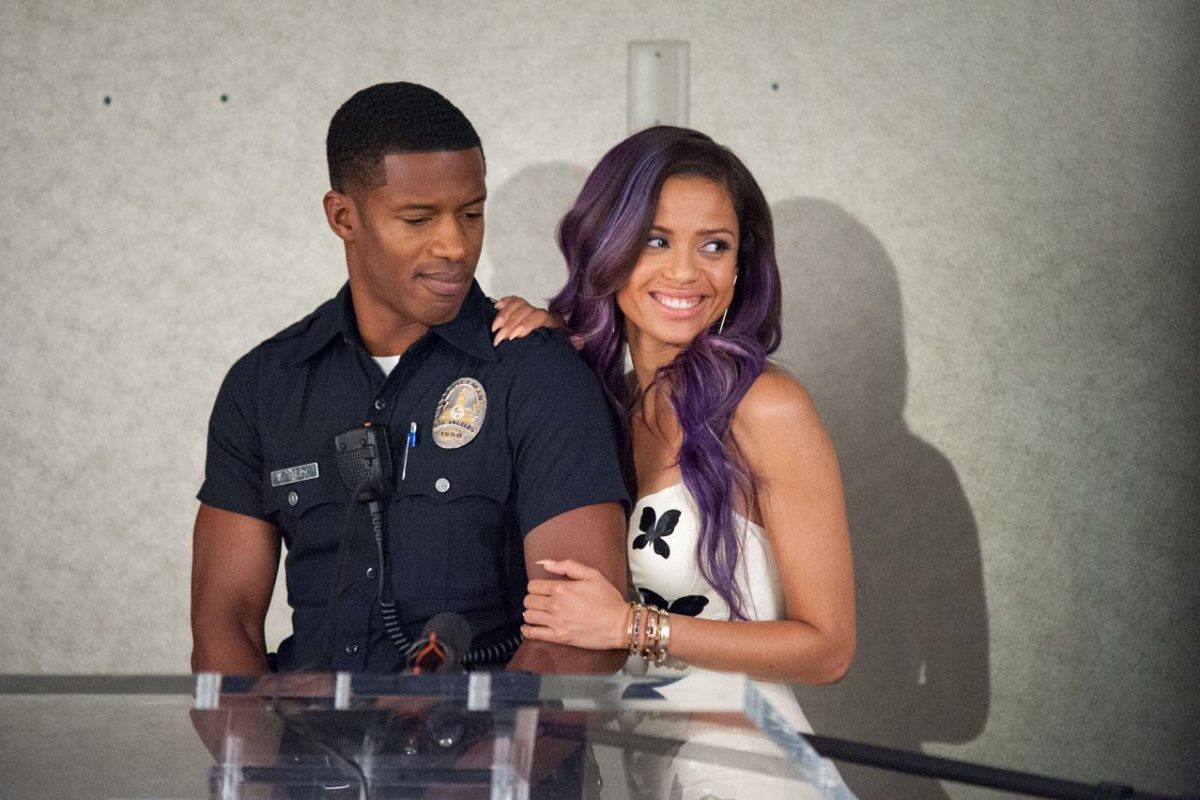
You could say that Beyond the Lights chronicles one woman’s journey from Rihanna to Alicia Keys.
British transplant Noni (Gugu Mbatha-Raw) is blowing up the U.S. charts with her duet with Kid Culprit (played by real-life rapper Machine Gun Kelly), and although the song highlights her wonderful voice, she’s also positioned as a “video ho”—a scantily clad, overly sexualized object for Culprit (and the male fan’s) gaze.
Not only is Noni’s mother, Macy Jean (Minnie Driver), okay with this video persona, she actively encourages it. An intensely proud working-class woman who had Noni when she was just 17, she’s become a backstage mother for the hip-hop era: If success means stripping down to a bullet bra and crawling up Kid Culprit’s leg, so be it.
But Noni is dying a bit inside and no one sees it—or at least, they choose not to. Shortly after receiving a Billboard Music Award, and in advance of the debut of her first album, Noni climbs onto the hotel balcony and prepares to jump. When Macy Jean sees her, she screams, alerting Kaz (hunky Nate James), the local cop on security duty that night. Turns out he’s also the son of the police commissioner (Danny Glover) and being groomed for a career he doesn’t really want (politics). He calmly tries to talk Noni off the ledge, but it doesn’t work. She jumps, he grabs her, pulls her up, and tells her that he “sees” her—that is, not just the celebrity but the woman inside.
There’s much to like about Beyond the Lights—the two excellent lead performances, the mimesis of it all (the BET Awards look like the BET Awards; the videos look like videos, etc.), the smart and compassionate script—but possibly my favorite thing is the way it shows how the giant, lurching machine of celebrity keeps chugging along, no matter what. Kaz is the only one who sees that Noni needs help. Everyone else is too concerned with covering up her suicide attempt (they say that she was tipsy and fell) and getting back on message (because “suicide isn’t sexy”) to really care. She may be the center of the Noni industry—but she’s also just a cog in its wheel.
Slowly, Noni falls for Kaz and takes refuge in his rock-steady world, far from the paparazzi and clubs. It’s very empowering when, later in the film, Noni pulls out her false nails and takes out her weave. Kaz loves the “real” Noni, not just the carefully crafted persona. (Full disclosure, though: I mourned for that glorious purple weave. It was fierce.)
Despite its hip-hop trappings, Beyond the Lights is actually quite old-fashioned. It’s a story about how the love of a good a man saves a woman. (It also has a slight, “Cover yourself up, girl” feel to it, as though it was directed by the mother Noni should have had.) I suppose you could argue that, through Noni, Kaz learns to embrace his own truth (basically, that he wants to hang out with Noni all the time). But she’s the one who goes on the real journey of self-discovery, largely thanks to him.
Writer director Gina Prince-Blythewood, who also did the wonderful—and more progressive—Love and Basketball, is like a gift to those of us who enjoy soapy melodramas with heart, smarts, and sex appeal. (And if you don’t enjoy those things, what is wrong with you?)
This is newcomer Gugu Mbatha Raw’s second lead role this year, along with Belle—and she couldn’t have picked a better one-two punch. In Belle, playing an 18th century French woman, she’s demure and corseted, observing the social injustices around her with wide, omniscient eyes. Here, she’s believable as both the glammed up video diva and the earthy songstress she was meant to be. Like Prince-Blythewood, she’s a serious talent. I can’t wait to see what these talented women do next.
